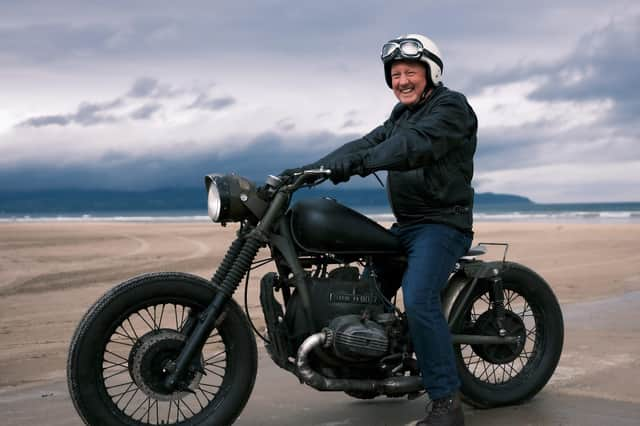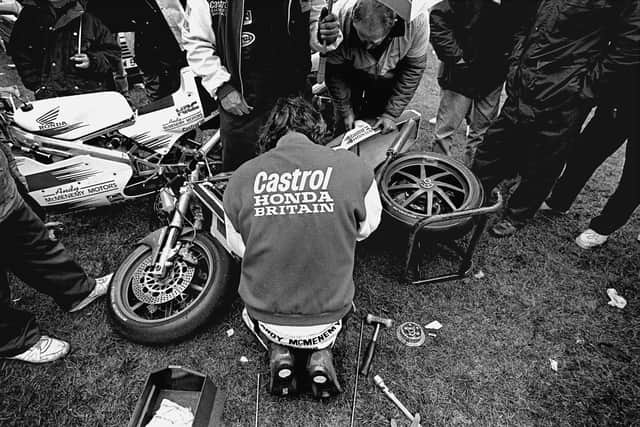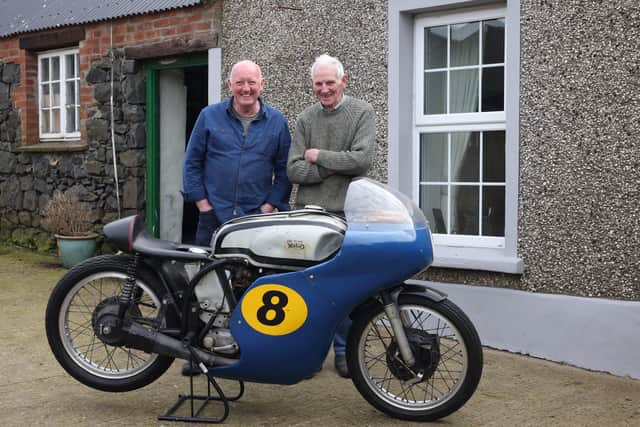Stephen Davison: ‘Joey Dunlop was my hero and the rider I wanted to photograph most’


The Motorcycle Mavericks is a one hour film that explores the stories of local racers and engineers who have made a significant mark on the sport.
Many of them shared an Ulster-Scots background. I had worked with DoubleBand Films, the production company behind the film, on several previous projects.
Advertisement
Hide AdAdvertisement
Hide AdThat included Road, the documentary that tells the story of the Dunlop family, Ballymoney’s road racing dynasty.


Nevertheless, I was stunned when they asked me to present The Motorcycle Mavericks!
Talking into a lens wasn’t something that came naturally to me. I’m a photographer and prefer to be on the other side of the camera, capturing the action, but I realised this was a great opportunity to explore a subject I’ve been immersed in for over 30 years.
I had three motorbike mad uncles, one having raced himself, and they took me to my first race when I was 12. Initially, I was terrified by the noise and speed but it was also exciting and I quickly became hooked.
Advertisement
Hide AdAdvertisement
Hide AdWe cheered on local riders like Tom Herron, Ray McCullough, Joey Dunlop and Brian Reid as they beat the big names from ‘over the water’ and I soaked up the tales of great racers and races from the past.


We were country people from Co Antrim and the roads these heroes were racing on were the same sort of lanes we used on our way to school or work.
The familiar was transformed and there was something magical about that for a wide-eyed youngster like me.
As I got older, I wanted to capture some of the action and I bought my first camera.
Advertisement
Hide AdAdvertisement
Hide AdWithin a couple of years the hobby became the day job when I began working as a photographer for a local newspaper.
Over the past three decades, I have been recording the sport in words and pictures but television always has the best access.
History of motorcycle racing
Working on The Motorcycle Mavericks opened new doors as we explored 100 years of motorcycle racing history.
It was thrilling to read the letters in the Public Records Office archives between Harry Ferguson, the Co Down inventor and engineer, and Sir James Craig, the first Prime Minister of Northern Ireland, in 1921. Ferguson was lobbying for a new international motorcycle race that would put the fledgling state on the global motorsport map.
Advertisement
Hide AdAdvertisement
Hide AdCraig loved the idea of hosting such an event but he was still a little uneasy given the continuing civil unrest.
The race went ahead in 1922 on the Clady course in Co Antrim just a few miles from where I live now.
I travel along the famous Seven Mile Straight almost every day on my way to Belfast and we searched out the layout of the original circuit, discovering roads which, here and there, have changed very little.
Alongside the racers and the races, The Motorcycle Mavericks also explores the work of local engineers like Rex McCandless whose innovative work would change the direction of motorcycle racing at home and much further afield.
Advertisement
Hide AdAdvertisement
Hide AdA rider who tried one of McCandless’s new frames said it made his motorbike feel like a featherbed and the name, ‘Featherbed’, stuck.
After spending a day exploring the motorcycle collection at the Ulster Folk and Transport Museum, it became obvious just how clever an engineer McCandless was.
Seeing dozens of old Nortons being raced at the Goodwood Revival proved the enduring appeal of his innovation.
McCandless wasn’t an easy man to get on with though, a common enough trait amongst ‘thran’ Ulster-Scots. He fell out with fellow inventor, Harry Ferguson and turned his attention to developing cars and a mini helicopter instead but his ‘can-do’ attitude remained an inspiration.
Meeting Richard Creith
Advertisement
Hide AdAdvertisement
Hide AdRichard Creith, is another man who doesn’t give up easily. Visiting his Bushmills farm, I heard his David and Goliath story of winning the North West 200 and Ulster Grand Prix on a Norton built by Ballyclare man, Joe Ryan during an era when Japanese and Italian machines were beginning to dominate the sport.
McCandless and Creith forged a path that was followed by engineers like Professor Gordon Blair in the Mechanical Engineering department of Queen’s University, Belfast where Ray McCullough worked as a technician.
Their innovative work caught the attention of the Japanese motorcycle manufacturer, Yamaha when Ray beat the factory prepared machine of Phil Read at the 1971 Ulster Grand Prix.
We visited Ray at home in the Co Down hills with Robert Fleck who explained why he wanted to carry on the work of his predecessors.
Advertisement
Hide AdAdvertisement
Hide AdRobert, from Ballyclare, elevated the Belfast university to the international stage by launching the QUB race team which competed in the Grand Prix world championships with Jeremy McWilliams.
McWilliams is still racing as he approaches his 60th birthday and we chatted at the North West 200 about those glory days during the nineties when he was taking on and sometimes beating riders like Valentino Rossi. Pure ‘Roy of the Rovers’ stuff!
Joey Dunlop and Jonathan Rea
Two other racers who have put Northern Ireland motorcycling well and truly on the map are Joey Dunlop and Jonathan Rea. Both men have risen from humble backgrounds to become world champions, their names known all over the planet.
Joey was my hero growing up and the rider I wanted to photograph most when I bought that first camera over 30 years ago.
Advertisement
Hide AdAdvertisement
Hide AdTogether with his younger brother, Robert, the Dunlops created indelible memories for me and anyone else who witnessed them in action.
It was an incredible privilege to hear their brother, Jim, talk about how the Ballymoney siblings learned at the feet of their father how to transform a motorbike into a race winner.
When I am photographing a road race there is only one chance to capture the image. There are no second takes but in television everything shot is repeated several times at least.
After a while you start to dread being told to ‘do it again’ but that wasn’t the case during one day of shooting. On Benone beach, where racing on two wheels on the sand took place in 1911 before the bikes were allowed to compete on the roads, I was given a bike to ride up and down the strand.
Advertisement
Hide AdAdvertisement
Hide AdThe beach was deserted and the sun was shining as the cameras started to roll- and there were no complaints when the director said ‘Do it again’!
Northern Ireland’s most recent champion on two wheels, Jonathan Rea, took time out from trying to become a world champion for a seventh time to recount how his love of motorcycles and racing had been passed down from his grandfather and father to him.
Even the slightest glance at this remarkable history highlights how Northern Ireland has punched way above its weight in motorcycle racing over the past 100 years.
Reading about those people who made that happen is one thing but having the opportunity to meet them, hear their stories and share their memories during the making of The Motorcycle Mavericks has been a special privilege. Hopefully that journey can now be shared through the programme.
Advertisement
Hide AdAdvertisement
Hide Ad*The Motorcycle Mavericks is scheduled to air on BBC One Northern Ireland on Tuesday, September 13, at 10.40pm. Please be advised this may be subject to change following the death of Her Majesty The Queen.
Comment Guidelines
National World encourages reader discussion on our stories. User feedback, insights and back-and-forth exchanges add a rich layer of context to reporting. Please review our Community Guidelines before commenting.